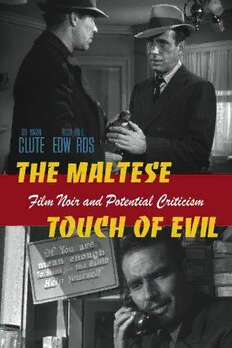
The Maltese Touch of Evil: Film Noir and Potential Criticism PDF
Preview The Maltese Touch of Evil: Film Noir and Potential Criticism
The Maltese Touch of Evil Shannon Scott Clute and Richard L. Edwards Dartmouth College Press Hanover, New Hampshire THE MALTESE TOUCH OF Film Noir and Potential Criticism EVIL Dartmouth College Press An imprint of University Press of New England www.upne.com © 2011 Trustees of Dartmouth College All rights reserved Manufactured in the United States of America Designed by April Leidig-Higgins Typeset in Garamond Premier Pro by Copperline Book Services, Inc. University Press of New England is a member of the Green Press Initiative. The paper used in this book meets their minimum requirement for recycled paper. For permission to reproduce any of the material in this book, contact Permissions, University Press of New England, One Court Street, Suite 250, Lebanon NH 03766; or visit www.upne.com Library of Congress Cataloging-in-Publication Data Clute, Shannon Scott. The Maltese touch of evil : film noir and potential criticism / Shannon Scott Clute and Richard L. Edwards. p. cm. — (Interfaces: studies in visual culture) Includes bibliographical references and index. Includes filmography and podcastography. ISBN 978-1-61168-047-8 (pbk. : alk. paper) ISBN 978-1-61168-185-7 (ebook) 1. Film noir — History and criticism. 2. Podcasting — Study and teaching. I. Edwards, Richard L., 1965– II. Title. PN1995.9.F54C68 2011 791.43'6556 — dc23 2011038835 5 4 3 2 1 For our wives, Cathie and Sybil; without you neither this nor any other project would come to fruition. And for our daughters, Tallulah, Vivienne, and Eve; may you be more than a little hard-boiled. Doit-on s’en tenir aux recettes connues et refuser obstinément d’imaginer de nouvelles formules? (Must one adhere to known quantities and obstinately refuse to imagine new formulas?) — François Le Lionnais, “LA LIPO (Le premier Manifeste)” La lecture potentielle a le charme de faire ressortir la duplicité des texts, qu’ils soient oulipiens ou non. (Potential reading has the charm of making manifest the duplicity of texts, be they oulipian or not.) — Harry Mathews, “L’algorithme de Mathews” (emphasis ours) On constraint: having to work within limits produces formal solutions with their own elegance and beauty. Wouldn’t it be a bit philistine to point to the constraints of the sonnet as making it unlikely that the poet could produce satisfying work, having to keep to fourteen lines and a rhyme scheme? In media studies the outstanding example of formalist rehabilitation of elaborately constrained work has been our discovery of how very, very beautiful, whatever else they may be, the products of classic Hollywood studio system were. — John O. Thompson, “Dialogues of the Living Dead” Contents Acknowledgments xi Preface xv chapter 1 A Void in Film Noir Studies 1 chapter 2 One Hundred Thousand Billion Films Noir: Oulipian Works and Potential 11 chapter 3 Workshop of Potential Criticism: Anoulipism and Plagiarism by Anticipation 21 chapter 4 Build My Scaffolding High: Noir Films as Constrained Texts 33 chapter 5 Oufinopo: The Noiremes 45 postscript How We Wrote Our Noiremes 256 Postliminary 1 The Guilty Parties: Out of the Past: Investigating Film Noir 257
